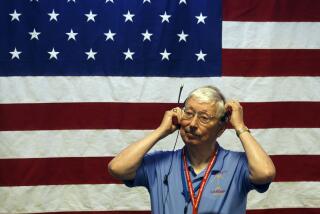Obituaries : T. Keith Glennan; First Head of Space Agency
- Share via
T. Keith Glennan, the academician who set the country on its path to the stars when he was named the first head of the National Aeronautics and Space Administration, died Tuesday.
A spokesman said Glennan, credited with luring German rocket scientist Wernher von Braun away from the U.S. Army and into the fledgling civilian space agency, was 89. He suffered a stroke and died in Mitchellville, Md.
When President Dwight D. Eisenhower named Glennan to administer NASA in 1958, Von Braun and his V-2 rocket team--which had been brought to the United States at the end of World War II--were working on missiles and space probes for the Army.
Glennan said he realized that Von Braun was dedicated more to eventual manned space exploration than he was to missiles and was able to bring him aboard an agency that was created from the merger of the laboratories of the National Advisory Committee on Aeronautics and space-oriented military operations.
Glennan remained in the NASA post for three years before returning to the presidency of Case Institute of Technology in Cleveland, now a part of Case Western Reserve University. He retired from Case in 1966.
He had taken over NASA 10 months after the launch of the first Soviet Sputnik satellite. The feeling of malaise that had settled over the country made Congress more than willing to give him anything he wanted.
U.S. accomplishments in those early years were modest compared to the spectacular orbiting of men and animals by the Soviets, but Glennan said he was “always convinced we would overtake the Soviets.”
During his tenure, the United States launched its first meteorological satellites (Tirus II and II), launched the balloon satellite Echo I and sent probes into space that detected the Van Allen radiation belt, of critical concern to future space missions.
Under his direction, NASA proposed a plan for a manned moon mission sometime after 1970, a project that President John F. Kennedy accelerated despite Eisenhower’s reservations.
After retiring from Case, Glennan became a U.S. representative to the International Atomic Energy Agency in Vienna. Earlier he had been one of five members of the Atomic Energy Commission named by President Harry S. Truman in 1950. Glennan resigned that post Oct. 30, 1952, the day before the first hydrogen bomb was tested in the Pacific.
More to Read
Sign up for Essential California
The most important California stories and recommendations in your inbox every morning.
You may occasionally receive promotional content from the Los Angeles Times.













